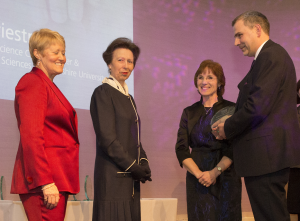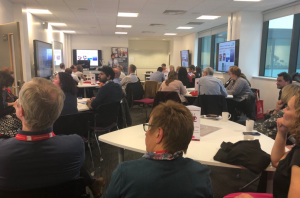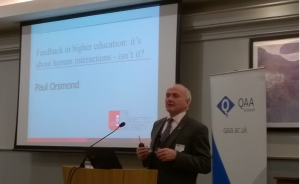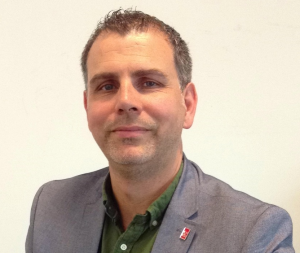March was a busy month for the Biological Sciences team. It started with Ian Davies and Dr Angela Priestman attending the Chief Scientific Officer’s annual conference at the Royal Society in London which brings together scientists and industry experts from all disciplines to discuss the application of science in healthcare. For us, the highlight of this event was being presented with the Chief Scientific Officer’s award for “Excellence in Education Delivery” by HRH The Princess Royal and Professor Sue Hill, Chief Scientific Officer for NHS England. Obviously we are tremendously proud to have received this national accolade, but more so because it reflects our close connections with employers and the importance we place on working with professions to develop learning and teaching that meets their future needs.
The month continued as we were joined by Dr Joanne Horne, Lead Healthcare Scientist at University Hospital Southampton and one of this year’s Chief Scientific Officer’s Women in Science and Engineering (WISE) Fellows. Jo visited the university on International Women’s Day to join a live TV panel with our Vice Chancellor, Professor Liz Barnes, to discuss how our courses help to increase social mobility and widen participation in higher education within the STEM careers. Whilst here, Jo visited our facilities and commented that she was “hugely impressed by our work, facilities and attitudes”. Interestingly, Jo’s connection with the department comes through interactions of Twitter, an important reminder of how important social networks can be in developing professional connections. In fact, from these online connections Jo and Ian have worked together on an article promoting the use of social media in professional practice.
Meanwhile, across at the Alderley Park BioHub, Dr Angela Priestman had a full house of industry colleagues, hearing about our degrees, apprenticeships and the skills and talents that our students can bring to industrial placements. The BioHub site is home to a large and growing list of life science companies and our residency there provides the opportunity for us to connect with employers working on the latest innovations and discoveries across the biomedical and pharmaceutical sectors.
Back on cam pus, and Ian Davies hosted our “Connected Pathology” event, which brought together pathology and healthcare science leaders from across England to discuss current trends in laboratory medicine, and how we can develop learning and teaching to make sure that the scientific workforce is innovative, creative and ready for the future. NHS Trusts from as far afield as Southampton, Great Ormond Street, Brighton and Leeds joined with leaders from NHS Improvement and the National Institute of Health Research to discuss how we can work together to develop the potential of staff, work collaboratively on research and innovation, and support future scientific leaders. Dr Sarah Williams, Dr Pauline Gowland, Dr Rich Halfpenny, Anne Turner and Dr Angela Priestman all ran workshops which developed much discussion for future projects.
pus, and Ian Davies hosted our “Connected Pathology” event, which brought together pathology and healthcare science leaders from across England to discuss current trends in laboratory medicine, and how we can develop learning and teaching to make sure that the scientific workforce is innovative, creative and ready for the future. NHS Trusts from as far afield as Southampton, Great Ormond Street, Brighton and Leeds joined with leaders from NHS Improvement and the National Institute of Health Research to discuss how we can work together to develop the potential of staff, work collaboratively on research and innovation, and support future scientific leaders. Dr Sarah Williams, Dr Pauline Gowland, Dr Rich Halfpenny, Anne Turner and Dr Angela Priestman all ran workshops which developed much discussion for future projects.
Another trip to the capital followed, with PhD Researcher Ellie Atkins heading to Westminster to present her research on urban hedgerow diversity at the Houses of Parliament. Ellie, and ecology lecturer Dr Paul Mitchel, were able to highlight the importance of the work in developing green infrastructure to senior scientists, researchers and MPs. Ellie’s work bridges the gap between what is know about urban ecology and understanding the benefit this brings to human health.

Further north now, and Paul Orsmond travelled up to Glasgow to present a keynote address to the Quality Assurance Agency Scotland conference, supporting a nation-wide “Focus on Feedback” project. As well as his focus on assessment feedback, Paul also discussed his research into student identity development and the role of invisible learning in education.
Later in the month, Dr Dave Skingsley hosted colleagues from the Ministry of Defence as they undertook training to equip them to identify disease-causing insects in the field. Using the entomological experience of Dave, Dr Angela Priestman, Dr Rich Halfpenny and Dr Paul Mitchel, this is part of a wider project which works with military environmental health officers to provide them with the skills and resources needed to provide support to natural disasters worldwide.

At Staffordshire University, we are the Connected University, connected to the needs of our students, to business and to society. Within Biological Sciences, these connections are vitally important to us – not only to ensure that our curriculum meets the needs of employers, but also to enable us to be influential within, and contribute to the professions we teach.
As our activities in March show, by working with policy makers, researchers, professional bodies and practitioners, our academic staffs’ connections keep us at the cutting edge of practice.
Ian is an HCPC registered Biomedical Scientist and course leader for our Healthcare Science programmes and can be contacted at:
ian.davies@staffs.ac.uk or via Twitter @StaffsBMS
Find more information about our Biological and Biomedical Science Courses at: http://www.staffs.ac.uk/undergraduate/subjects/biological-and-biomedical-sciences/


